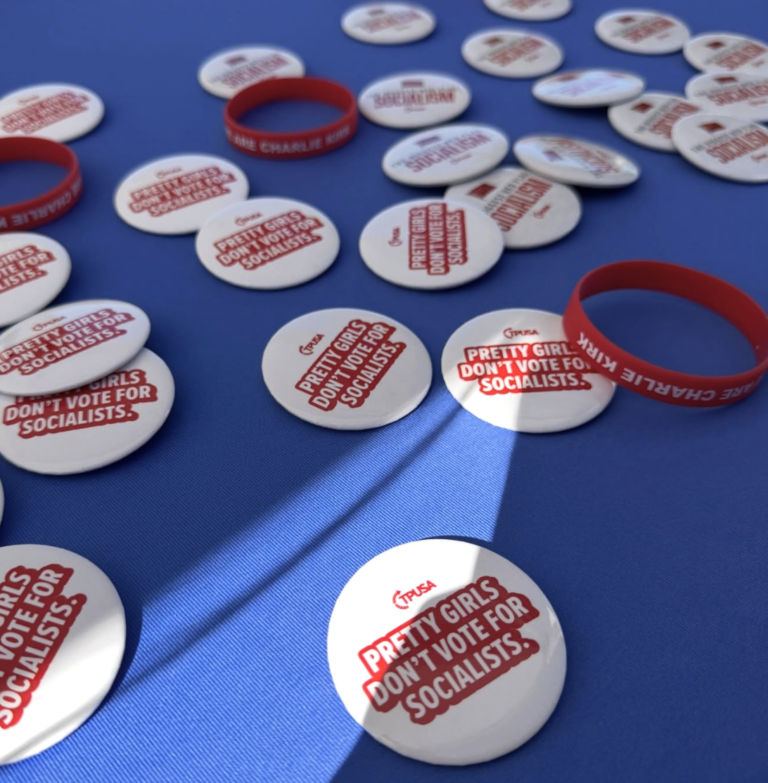The Wrong Debate: The Cardinal Conservatives’ Failure
As I walked to Usdan the other day, I noticed a small bake sale in which people were being charged different prices based on their race. The student group holding the bake sale, the Cardinal Conservatives, said they intended to protest affirmative action, which is a perfectly legitimate cause. Unfortunately, their “satirical” bake sale was a thoroughly unfunny and unintelligent way to address the issue of affirmative action.
There is no reason not to tackle controversial issues with humor. Great satire and controversy often go hand-in-hand. But if you’re going to tackle a sensitive subject with satire, you actually have to be funny. That’s the only thing that sets apart edgy comedy from ugly comedy.
Take, for example, the reaction to Vince Vaughn’s homophobic joke in the trailer for his upcoming movie, in which he says, “Electric cars are gay. Not homosexual gay, but my parents are chaperoning the school dance gay.” Gay and lesbian groups protested the joke, Anderson Cooper and Ellen DeGeneres publicly denounced it as homophobic, Vaughn’s film received a heap of bad publicity, and the joke was removed from the trailer.
Now compare this to the lack of any negative reaction to a similar joke in the 2005 hit, “The 40-Year-Old Virgin,” in which two characters trade insults about how gay the other one is (an example: “You know how I know you’re gay? You like Coldplay.”). Both jokes equate being gay to being lame. But whereas the joke in “The 40-Year-Old Virgin” had a fun tastelessness to it, Vaughn’s joke was awkward and required an explanation for why it shouldn’t be considered offensive. Similarly, the need for the Cardinal Conservatives’ bake sale to feature a banner saying, “This is a SATIRICAL event” should have been an indicator that something was seriously problematic about their satire.
Secondly, given the fact that the Cardinal Conservatives’ bake sale was a Wesleyan event alluding to affirmative action on the part of the admissions committee, the lack of Wesleyan-specific information was telling. If their argument is that affirmative action is bad for Wesleyan, then they must argue that the quality of the student body has decreased with the adoption of affirmative action policies. If they are not able to provide any evidence that the quality of the student body has decreased, then their argument is purely racial.
As it stood in Usdan, their bake sale’s only coherent argument against affirmative action was that it allowed more minority students into the school. It targets minority students as being inadequate for Wesleyan while providing no evidence of inadequacy. Thus, the Cardinal Conservatives simply produced a racial provocation, not the grounds for a legitimate discussion about a controversial issue.
There are plenty of good arguments against affirmative action. Several African American conservatives, such as Clarence Thomas, have complained that affirmative action undermines the legitimacy of their accomplishments. Affirmative action that is completely race-based raises plenty of problems. At my high school, for example, I frequently saw highly-privileged students who had a minuscule percentage of minority heritage get actively recruited by universities for the supposed diversity they would bring to a school.
Affirmative action is also fraught with many important issues about the nature of race, as well as the basic idea of making up for past wrongs against a segment of society. It is truly unfortunate that, instead of thoughtfully addressing any of the problems that can come with affirmative action, the Cardinal Conservatives went with an argument resembling Fox News rhetoric; essentially, that minorities are favored in our society and that white people face unfair odds.
Wesleyan is very much in need of liberal-conservative debate (as opposed to Democrats vs. the Green Party), and there is plenty of room for conservative viewpoints on campus. Mytheos Holt, for example, was able to create healthy political discussions at our school. His opinions, while rarely ones that I agreed with, were generally well-thought-out, opening the door for constructive debate.
The Cardinal Conservatives have failed to do this. By fumbling the heated racial issue of affirmative action, the Cardinal Conservatives have lost the legitimacy that could have fueled respectable discussions. I truly hope that, in the future, the group will engage in active and informed debates over the controversial issues of our times. But for the moment, they have portrayed themselves as little more than petty race-baiters.







The column makes two arguments. The first is that the author was not amused by the bake sale. Well, humor is subjective.
Second, “If their [the bake-sale students’] argument is that affirmative action is bad for Wesleyan, then they must argue that the quality of the student body has decreased with the adoption of affirmative action policies.” Two responses to that. If you are awarding preferences on the basis of race, then you are not admitting simply the best qualified students, and the quality of the student body declines. That’s pretty straightforward. But, second and more importantly, there are other costs to the use of racial preferences besides the impact on the quality of the student body. Such as: It is personally unfair, passes over better qualified students, and sets a disturbing legal, political, and moral precedent in allowing racial discrimination; it creates resentment; it stigmatizes the so-called beneficiaries in the eyes of their classmates, teachers, and themselves, as well as future employers, clients, and patients; it fosters a victim mindset, removes the incentive for academic excellence, and encourages separatism; it creates pressure to discriminate in grading and graduation; it breeds hypocrisy within the school; it encourages a scofflaw attitude among college officials; it mismatches students and institutions, guaranteeing failure for many of the former; it papers over the real social problem of why so many African Americans and Latinos are academically uncompetitive; and it gets states and schools involved in unsavory activities like deciding which racial and ethnic minorities will be favored and which ones not, and how much blood is needed to establish group membership.
The comment you just wrote is a solid argument. Whether or not someone agrees with you, you have presented a comprehensive argument that can foster discussion. The bake sale failed to do that, and did little more than provoke minority students and seemingly blabber that they were unqualified for Wesleyan. Next time, host a discussion where you present these arguments. Not a bake sale that charges different prices based on race.
And as far as humor goes, it is subjective. But I think the vast majority of humankind can agree that The 40-Year-Old Virgin was hilarious, and the trailer for Vince Vaughn’s upcoming film “The Dilemma” (source of the homophobic joke referenced in the article) was lame as hell. Likewise, Dave Chappelle, South Park, etc. feature hilarious racial humor that tackles controversial issues. You might have noticed a distinct lack of LOLing at the “SATIRICAL” bake sale.
Thanks for your kind words about my argument, but I think you are being unrealistic in requiring all protests/political theater to be elaborately argued. And I don’t see the bake sale as race-baiting: To the contrary, its obvious point is that racial preferences in admission treat people differently because of skin color or what country your ancestors came from, and that’s offensive, just as it is offensive to charge people different amounts for a cookie on the basis of race or ethnicity. The objection is not to the number of people in this or that group who are admitted; the objection is to the racially discriminatory process of admission.
On Thu, Nov 4, 2010 at 4:46 PM, Tayjun Rodney wrote:
We have to factor affirmative action into the American history narrative, and accept that some groups have been discriminated against by others. I don’t agree with giving affirmative action to any other groups but those that were here since America’s founding and have played a part in its insurgence. That means blacks, women and Natives.
First, I think we must agree upon the value judgment that all of us live now in a nation developed as a result of the toil of our spiritual ancestors. In other words, whether we accept it or not, we are inheritors of all that is America’s history: its good, its bad, and its ugly through the people that have formed it over the years. In saying that we share and benefit from America’s history, then it follows that we must at least share and benefit (in some way or another) from America’s history as well.
And if we agree that we are on equal at least in this experience, then we may be equal in yet one more way.
While benefitting from the luxuries of the state in everyday life, we consent to paying taxes. The majority see this as fair; as a just way of doing things. I believe too that we should view view affirmative action in this way for in enforcing it we are simply repaying the the hard work of progenitors who suffered horribly as a group, and more pointedly provided for base on which we all stand upon today. Indeed, as a country, we should focus on “paying our taxes” to those disenfranchised groups that have been exploited for our collective gain. Our mandate should be to provide for the well-being of the people that have in part inherited the ills of our mideeds in the most important ways possible: socially, economically and intellectually.
Great crimes inspire great clean-up efforts.
Correction:
“In saying that we share and benefit from America’s history, then it follows that we must at least share and benefit (in some way or another) from America’s grievances as well. “
Since when did Affirmative Action morph into “racial preferences”? And how is it that recruitment efforts equal Affirmative Action? Need a definition of Affirmative Action? Read Presidential Executive Orders 11246 & 11375.
The only way to deal with this vast system of preferences in private schools like Harvard and Wellesley from alumni legacies to development cases, to race etc where whites are the main beneficiaries is to deny these private schools every cent of public levy tax money be it for research or student loans.
Leo, I’m really not sure that you know what you’re talking about.
How are whites the main beneficiaries?
Of course whites are the main beneficiaries of preferences at the Ivies be it Harvard or Princeton, there is a vast system of preferences for the children of alumni, faculty and administrators, the wealathy and famous who are not alumni, athlethes, geographical preferences etc. at Harvard. If grades were the sole basis of the of admissions at Harvard along with SAT scores then 70 % of the entire freeshman class will disappear. Google my comments on this matter of Fiat LUX at Stanford.